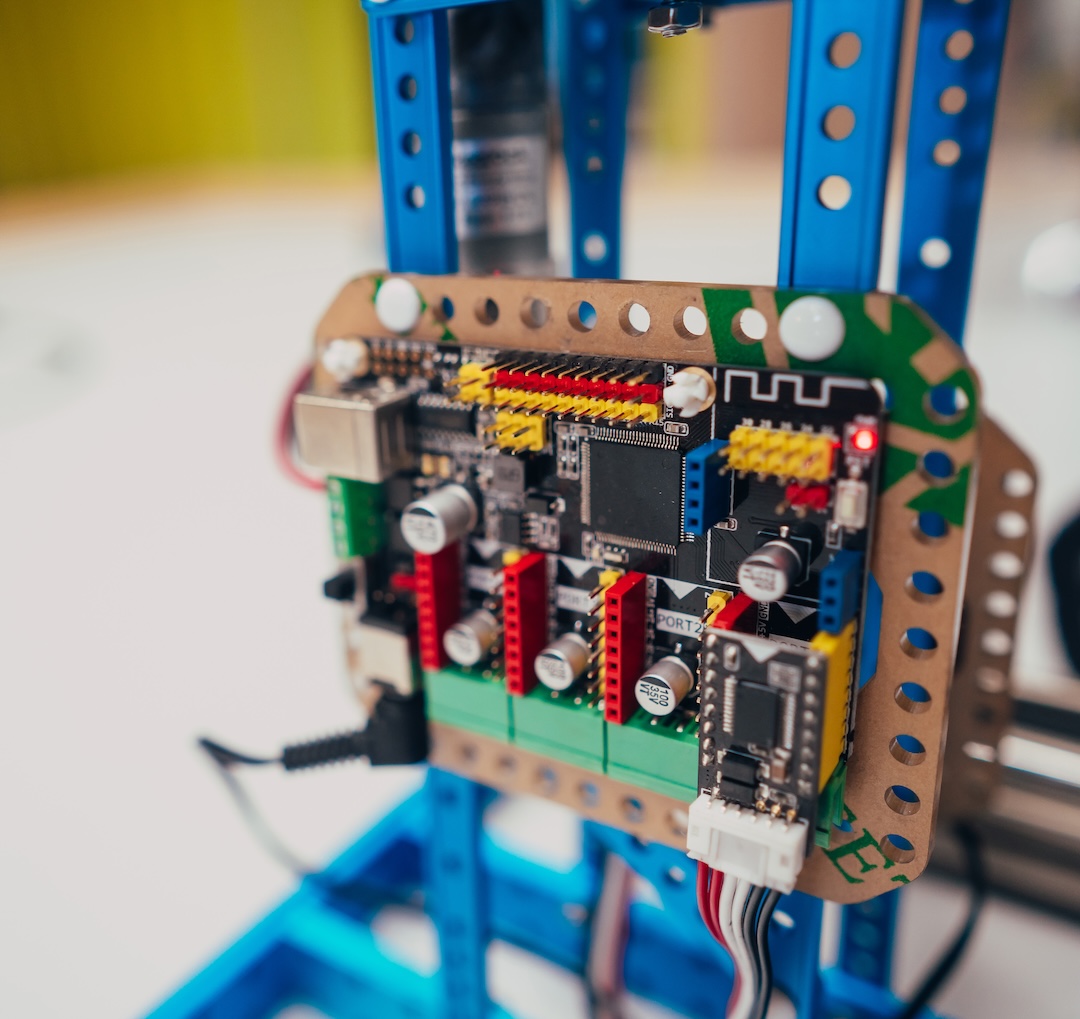Mechatronics Engineering Programme
Training qualified engineers that proffer solution to engineering challenges in line with rapid changes in technology and can also contribute to growth in the industries in Nigeria and beyond.
Programme Overview
Mechatronics Engineering programme in Bowen University aims at training qualified engineers that proffer solution to engineering challenges in line with rapid changes in technology and can also contribute to growth in the industries in Nigeria and beyond. The training is to produce graduates, who are producers of goods and services, and who, upon graduation, are functional engineers in industries, researchers, scholars in academia, or successful entrepreneurs in engineering-propelled ventures. The training is designed to place the graduates on the leading edge of technology.
The Mechatronics Engineering programme is designed to train graduates who are inventors and innovators rather than mere users. The programme emphasizes not only the engineering design in general but also smart design and the optimal utilization of locally available raw materials for the production of goods for local consumption and export. This is in support of a major target of the Sustainable Development Goals (SDGs) which aim to halve the proportion of people living on less than $1 a day, and those suffering hunger by the year 2035. The programme also supports SDG goals 7 on Investing in solar, wind and thermal power, improving energy productivity, and ensuring energy for all is vital if we are to achieve by 2030. Expanding infrastructure and upgrading technology to provide clean and more efficient energy in all countries will encourage growth and help the environment. For this purpose, the nation must have a very vibrant industrial sector that will provide gainful employment for the citizens as well as provide the goods and services that modern societies thrive on. It is expected that the Mechatronics Engineers from the Department will play a major role in realizing these goals.
Programme Educational Objectives (PEOs)
The requirement for Programme Educational Objectives (PEOs) in engineering programs was integrated into the Benchmark for Minimum Academic Standards (BMAS) by the regulatory agency for engineering education in 2017. Subsequently, the Mechatronics programme, Faculty of Engineering at Bowen University formulated its own PEOs in collaboration with their stakeholders and it was approved by the University Senate.
The PEOs outline the expectation of our graduates after five years of professional practice. They are centered around the idea of graduates contributing meaningfully to society through the application of contemporary technologies and best practices. The overarching aim is to empower adequately trained graduates from Mechatronics engineering backgrounds to:
- PEO1: Demonstrate proficiency in the design, analysis, and implementation of integrated electromechanical systems by applying principles of mechanical engineering, electrical engineering, and computer science.
- PEO2: Participate in life-long and professional development, keeping pace with advancements in technology and adapting to evolving trends in the field of Mechatronics Engineering throughout their careers.
- PEO3: Demonstrate an understanding of global issues and cultural diversity, incorporating global perspectives into engineering practice to address the challenges of a rapidly changing and interconnected world.
- PEO4: Demonstrate commitment to integrity, social responsibility, and sustainable development while considering the societal impact of their engineering solutions.
- PE05: Exhibit effective leadership, communication, and teamwork skills, enabling them to collaborate efficiently with diverse teams and contribute effectively to multidisciplinary projects in both professional and societal contexts.
Admission Requirements
To be admitted into the Mechatronics Engineering program at Bowen University, the applicant needs to meet the following requirements:
- Secondary School Graduation: Have graduated from an accredited secondary school.
- UTME Scores: Achieve the required scores on the Unified Tertiary Matriculation Examination (UTME) set by Bowen University.
- O’ Level Subjects: Pass the Senior School Certificate Examination (SSCE)/General Certificate Examination (GCE) Ordinary Level (O’ Level) subjects specific to the program.
- Bowen University Screenings: Pass Bowen University’s aptitude and character screening tests.
| PROGRAMME | ADMISSION REQUIREMENT |
|---|---|
| The minimum entry requirements for admission into Mechatronics Engineering programme in Bowen University are credit level passes in 5 subjects at the SSCE/GCE O' Level/NECO/NABTEB or its equivalent obtained at not more than two sittings. The subjects passed must include credit pass in English Language, Mathematics, Physics, Chemistry and either credit pass in Biology, or Technical Drawing. A credit pass in Further Mathematics is an added advantage. |
| REQUIREMENTS | |||
|---|---|---|---|
| DIRECT ENTRY | UTME | UTME SUBJECTS | WAIVER |
| 1. A minimum of two ‘A’ Level passes in Science subjects including Mathematics and Physics | Five ‘O’ Level credits including English, Mathematics, Physics, Chemistry plus one other Science or Social Science subject. | English, Physics, Mathematics and Chemistry. | Nil |
| 2. N.C.E with at least Credit in Mathematics, Physics and one other Science subject. | |||
| 3. National Diploma in Computer Engineering with at least an Upper Credit from a recognized University or Polytechnic. |
Primary Areas of Specialisation
- Systems Automation
- Mechatronic Systems Design
- Robotics
- High level manufacturing systems
- Application of Artificial Intelligence to Machine Control
- Biomedical System Design
Career Opportunity
A Mechatronics degree from Bowen University opens doors to a range of exciting careers within the digital industry, researchers, scholars in academia, or successful entrepreneurs in engineering-propelled ventures. Our program equips you to design, build, and maintain innovative automated systems, preparing you for roles like Robotics Engineer, Automation Engineer, or Process Control Engineer. Your expertise extends beyond core engineering, with opportunities in Manufacturing, Sales & Service, and Applications Engineering. This blend of technical skills and problem-solving abilities positions you for success in the ever-evolving world of intelligent systems.
Get started today!
Discover the extensive, top-notch learning opportunities offered by Bowen University. This webpage contains the most recent details on mechatronics engineering programme offered at Bowen University.
The Programme Outcomes (POs)
For the mechatronics engineering programme are presented in Table 1.1.
| PO1 | Engineering knowledge: Apply the knowledge of Mathematics, Science, Engineering fundamentals, and an engineering specialization to the solution of complex engineering problems. |
|---|---|
| PO2 | Problem analysis: Identify, formulate, research literature, and analyze complex engineering problems reaching substantiated conclusions using first principles of mathematics, natural sciences, and engineering sciences. |
| PO3 | Design/development of solutions: Design solutions for complex engineering problems and design system components or processes that meet the specified needs with appropriate consideration for the public health and safety, and the cultural, societal, and environmental considerations. |
| PO4 | Conduct investigations of complex problems: Use research-based knowledge and research methods including design of experiments, analysis and interpretation of data, and synthesis of the information to provide valid conclusions. |
| PO5 | Modern tool usage: Create, select, and apply appropriate techniques, resources, and modern engineering and IT tools including prediction and modeling to complex engineering activities with an understanding of the limitations. |
| PO6 | The engineer and society: Apply reasoning informed by the contextual knowledge to assess societal, health, safety, legal and cultural issues and the consequent responsibilities relevant to the professional engineering practice. |
| PO7 | Environment and sustainability: Understand the impact of the professional engineering solutions in societal and environmental contexts, and demonstrate the knowledge of, and need for sustainable development. |
| PO8 | Ethics: Apply ethical principles and commit to professional ethics and responsibilities and norms of the engineering practice. |
| PO9 | Individual and team work: Function effectively as an individual, and as a member or leader in diverse teams, and in multidisciplinary settings. |
| PO10 | Communication: Communicate effectively on complex engineering activities with the engineering community and with society at large, such as, being able to comprehend and write effective reports and design documentation, make effective presentations, and give and receive clear instructions. |
| PO11 | Project management and finance: Demonstrate knowledge and understanding of the engineering and management principles and apply these to one’s own work, as a member and leader in a team, to manage projects and in multidisciplinary environments. |
| PO12 | Life-long learning: Recognize the need for, and have the preparation and ability to engage in independent and life-long learning in the broadest context of technological change |









